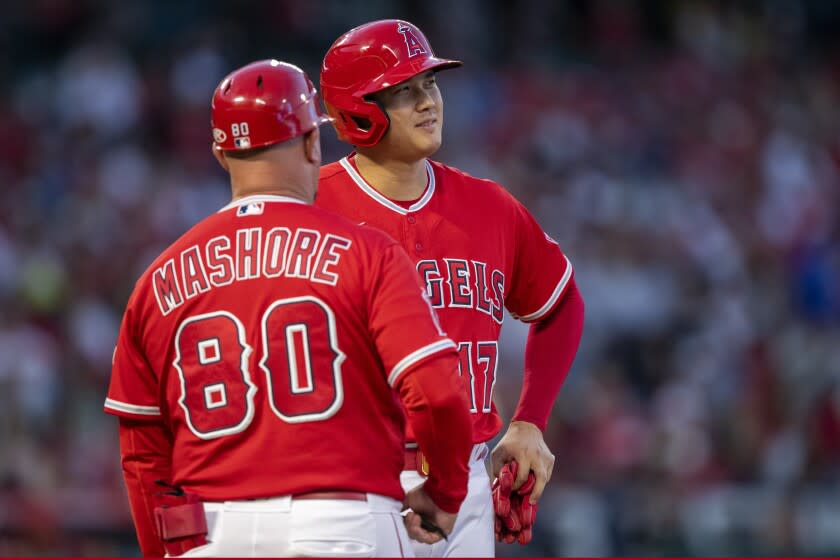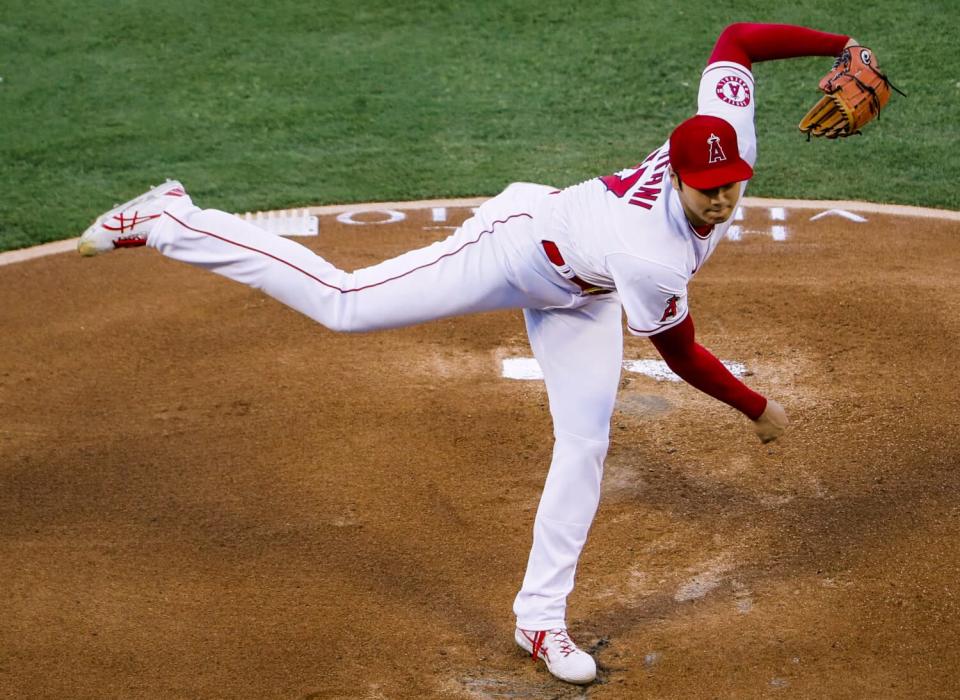
Shohei Ohtani is a planner.
The day before the All-Star Game, Ohtani acknowledged he has long dreamed of being inducted into the Hall of Fame, revealing his move to the major leagues was timed to optimize his chances.
The American League’s leadoff hitter also spoke about wanting to represent Japan at the World Baseball Classic next year, saying he’s informally broached the subject with Angels officials, who sound as if they will allow him to play in the tournament.
Here’s what’s worrisome for the Angels: When asked on Monday about his future with the franchise, he replied with a series of nonanswers.
Ohtani didn’t say he wanted to be traded before the Aug. 2 deadline. But he didn’t say he wanted to stay either.
“It doesn’t really change what I do, of course,” Ohtani said in Japanese. “As long as I’m with the Angels, I want to do my job the best I can. I don’t know what’s going to happen in the future, but, like I said, I’d like to focus game by game on what I have to do, pitching and hitting.”
Does he have any feelings of not wanting to be traded?
“More than my feelings, that will be determined by what the organization wants to do,” he said. “When it comes to something I can’t control, I don’t really have any feelings about what I want.”
As for his future with the team, Ohtani said, “I don’t know.”
He certainly wasn’t making a case to be retained.
By now, Ohtani should have a decent idea of whether he wants to play for the Angels beyond next season, after which he will be eligible for free agency.
Ohtani doesn’t often speak in definite terms, but when he does, his pronouncements sound like personal manifestos, which is why the widespread expectation in the industry is that he will be playing elsewhere in 2024.
Five years ago, at a farewell news conference in Tokyo, Ohtani said he was departing for the major leagues with the intention of becoming the No. 1 player in the world. Asked about the World Series, he replied, “As someone aiming to be the No. 1 player in the world, I think it’s a place you have to pass through.”
With the Angels crashing out of contention last year, Ohtani said, “I like the fans. I like the atmosphere in the organization. But my feelings of wanting to win are stronger.”
Well, he’s not winning anytime soon with the Angels, regardless of his claims on Monday about their potential to do so.


Ohtani is too smart to not recognize this.
That doesn’t mean general manager Perry Minasian should trade him. Trade him and then what? The source of the team’s problems will still be there. The Angels will still be owned by Arte Moreno.
Moreno can point to his $190-million payroll as much as he wants. The reality is that a $190-million payroll isn’t a $190-million payroll when $36 million are earmarked for Anthony Rendon and the minor league system is too depleted to provide any cost-efficient reinforcements. Rendon, who is out for the season, is the most recent of the expensive busts signed at Moreno’s behest, joining the likes of Albert Pujols and Josh Hamilton.
The farm system, which was neglected by Moreno, doesn’t have a single consensus top-100 prospect.
If they trade Ohtani, they might as well also trade Mike Trout, but the owner is bound to interfere with the rebuilding process. The cycle of destruction will repeat. If the Angels are going to lose, they might as well lose with Ohtani, who at least makes them worth watching every six days. He is a generational talent, and he continues to improve.
Already, Ohtani is a considerably more formidable pitcher than he was last year, something he attributed to being another year removed from reconstructive elbow surgery. As a pitcher, he’s 9-4 with a 2.38 earned-run average. Ohtani asked to not be used as a pitcher in the All-Star Game, as he is scheduled to start for the Angels when the regular season resumes Friday.
“I think what’s most important is that I’m physically capable of playing every game at maximum effort without any hesitation,” he said.
As a hitter, Ohtani has 19 home runs. This is more or less the kind of two-way performance he had in mind when he came from Japan.
“It wasn’t entirely as planned,” he said. “There were injuries. There were seasons in which I couldn’t perform the way I wanted. But when I look at the big picture, I think there were some good seasons. The organization supported me and created an environment in which I could play the way I wanted. I’m very appreciative of that.“
Cooperstown was always in his sights.
“That was one of my goals, so I wanted to come here on the early side,” Ohtani said. “I wanted to be here when I was still relatively young so that I could play and raise my level.”
Ohtani came to the United States when he was 23, which limited him to a $2-million bonus because he was classified as an international amateur. In another two years, he could have been a free agent and theoretically signed a nine-figure deal.
His plans now include the WBC, provided he is selected by Japan manager Hideki Kuriyama, who managed him for five years on the Nippon-Ham Fighters.
“If I have the ability, if they choose me, I want to play, of course,” Ohtani said.
He knows what he wants.
Regardless of whether he has informed the Angels of his wishes, they shouldn’t trade him. They can’t trade him. Their only choice is to wait and hope that his Japanese sense of obligation keeps him here.
This story originally appeared in Los Angeles Times.
